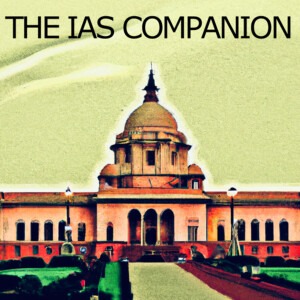
Polity EP 31 | Parliament | Part 2 | Constitution | UPSC podcast | laxmikant | Central Government
 2024-05-28
2024-05-28
Welcome back to THE IAS COMPANION. Today, we explore India's parliamentary system, focusing on key roles and procedures in the Lok Sabha and Rajya Sabha.
Leaders: The Leader of the House, usually the Prime Minister, coordinates parliamentary business, while the Leader of the Opposition heads the largest opposition party and critiques government policies, enjoying cabinet minister status.
Whip: Party whips ensure member attendance and voting discipline, based on parliamentary conventions.
Sessions: Parliament meets thrice yearly, with sessions that can be adjourned, prorogued, or dissolved. The Lok Sabha dissolves after five years or earlier; the Rajya Sabha is permanent.
Quorum and Voting: A quorum requires one-tenth of members. Voting is by majority, with special cases needing more.
Language: Hindi and English are official, with provisions for other languages.
Ministers' Rights: Ministers and the Attorney General can participate in either House but cannot vote.
Devices:
- Question Hour: First hour for questions.
- Zero Hour: Informal urgent matters.
- Motions: For discussions and decisions, including no-confidence, adjournment, and censure motions.
- Points of Order and Discussions: Address rule breaches and important issues.
Youth Parliament: Educates young people on parliamentary procedures and democratic values.
Thank you.
#UPSC #IASprep #civilserviceexam #IASexamination #IASaspirants #UPSCjourney #IASexam #civilservice #IASgoals #UPSC2024 #IAS2024 #civilservant #IAScoaching #aUPSCmotivation #IASmotivation #UPSCpreparation #IASpreparation #UPSCguide #IASguide #UPSCtips #IAStips #UPSCbooks #IASbooks #UPSCexamstrategy #IASexamstrategy #UPSCmentorship #IASmentorship #UPSCcommunity #IAScommunity #UPSCpreparation #IASpreparation #UPSCguide #IASguide #UPSCtips #IAStips #UPSCbooks #IASbooks #UPSCexamstrategy #IASexamstrategy #UPSCmentorship #IASmentorship #UPSCcommunity #IAScommunity
More Episodes
Create your
podcast in
minutes
- Full-featured podcast site
- Unlimited storage and bandwidth
- Comprehensive podcast stats
- Distribute to Apple Podcasts, Spotify, and more
- Make money with your podcast
It is Free
- Privacy Policy
- Cookie Policy
- Terms of Use
- Consent Preferences
- Copyright © 2015-2024 Podbean.com





